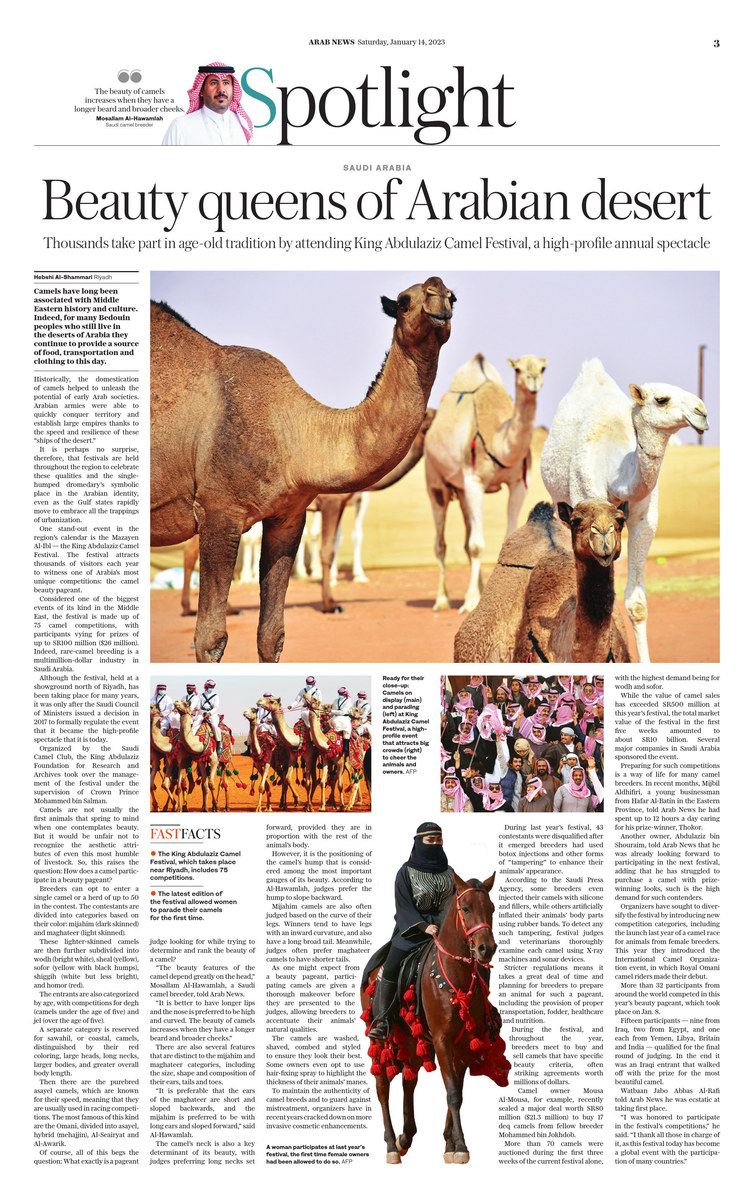RIYADH: Camels have long been associated with Middle Eastern history and culture. Indeed, for many Bedouin peoples who still live in the deserts of Arabia they continue to provide a source of food, transportation and clothing to this day.
Historically, the domestication of camels unleashed the potential of early Arab societies. Arabian armies were able to quickly conquer territory and establish large empires thanks to the speed and resilience of these “ships of the desert.”
It is therefore perhaps no surprise that festivals are held throughout the region to celebrate these qualities and the single-humped dromedary’s symbolic place in Arabian identity, even as the Gulf states rapidly embrace the trappings of urbanization.
One stand-out event in the region’s calendar is the Mazayen Al-Ibl — the King Abdulaziz Camel Festival. The festival attracts thousands of visitors each year to witness one of Arabia’s most unique competitions — the camel beauty pageant.
Considered one of the biggest events of its kind in the Middle East, the festival is made up of 75 camel competitions, with participants vying for prizes of up to SR100 million ($26 million). Indeed, rare-camel breeding is a multimillion-dollar industry in Saudi Arabia.
Although the festival, held at a showground north of Riyadh, has been taking place over many years, it was only after the Saudi Council of Ministers issued a decision in 2017 to formally regulate the event that it became the high-profile spectacle that it is today.
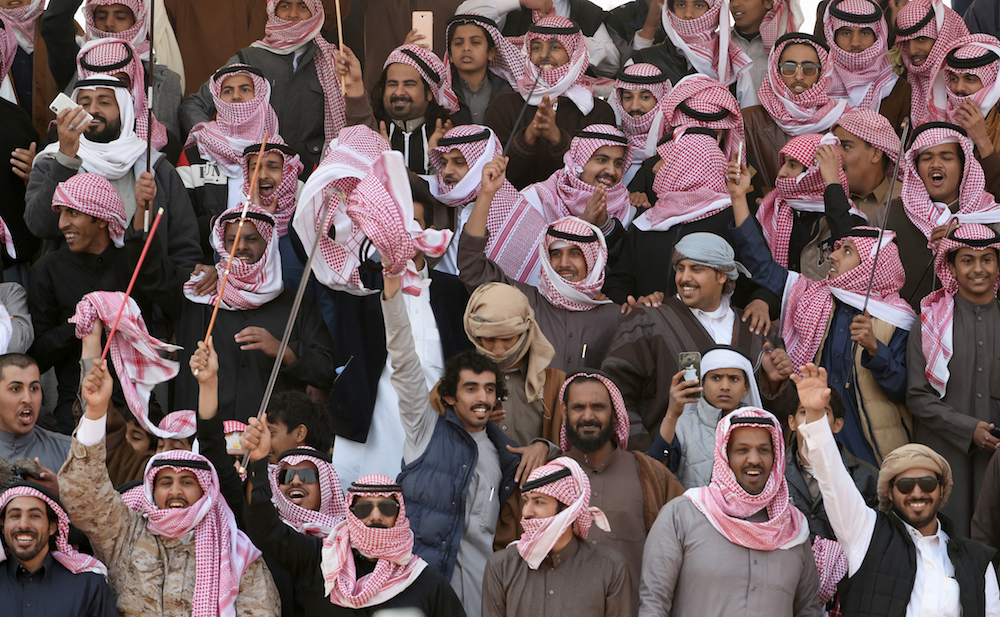
Saudi men cheer for camel owners taking part in a beauty contest during the annual King Abdulaziz Camel Festival in Rumah, some 160 kilometres east of Riyadh, on January 19, 2018. (AFP/File Photo)
Organized by the Saudi Camel Club, the King Abdulaziz Foundation for Research and Archives took over the management of the festival under the supervision of Crown Prince Mohammed bin Salman.
Camels are not usually the first animals that spring to mind when one contemplates beauty. But it would be unfair not to recognize the aesthetic attributes of even this most humble of livestock. So, this raises the question: How does a camel participate in a beauty pageant?
Breeders can either opt to enter a single camel or a herd of up to 50 in the contest. Candidates are then divided into categories based on their color — mijahim (dark skinned) and maghateer (light skinned).
These lighter-skinned camels are then further subdivided into wodh (bright white), sheal (yellow), sofor (yellow with black humps), shiggih (white but less bright), and homor (red).
Entrants are also categorized by age, with competitions for degh (camels under the age of five) and jel (over the age of five).
A separate category is reserved for sawahil, or coastal, camels, distinguished by their red coloring, large heads, long necks, large bodies, and greater overall body length.
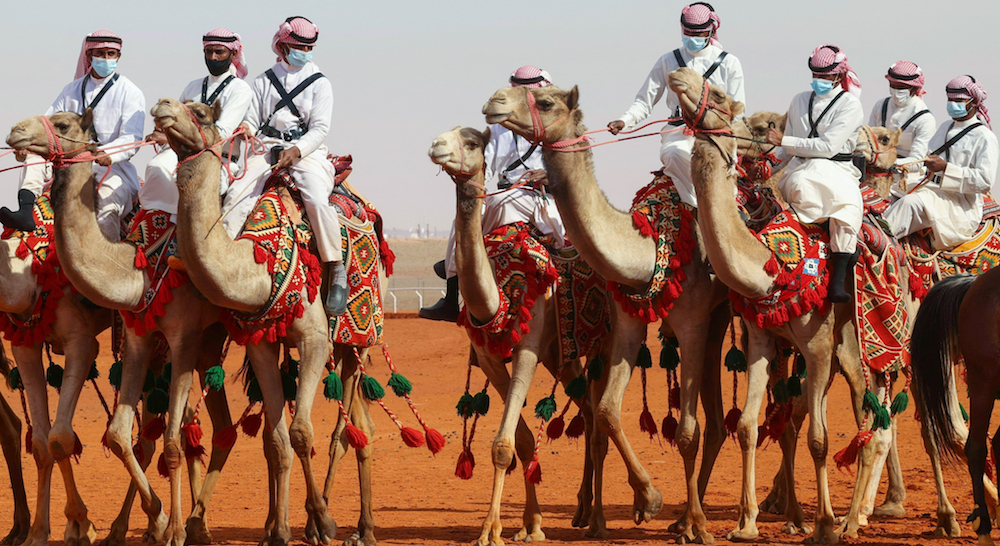
Saudi cameleers parade their animals during the sixth edition of the King Abdulaziz Camel Festival in the Rumah region, some 161Km east of the capital Riyadh. (AFP)
Then there are purebred asayel camels, which are known for their speed, meaning they are usually used in racing competitions. The most famous are the Omani, divided into asayel, hybrid (mehajjin), Al-Seairyat and Al-Awarik.
Of course, all of this begs the question: What exactly is a pageant judge looking for while trying to determine the beauty of a camel?
“The beauty features of the camel depend greatly on the head,” Mosallam Al-Hawamlah, a Saudi camel breeder, told Arab News.
“It is better to have longer lips and the nose is preferred to be high and curved. The beauty of camels increases when they have a longer beard and broader cheeks.”
There are also several features that are distinct to the mijahim and maghateer categories, including the size, shape and composure of their respective ears, tails and toes.
FASTFACTS
• Tens of thousands attend the King Abdulaziz Camel Festival, staged northeast of Riyadh.
• The latest edition of the festival allowed women to show off their camels for the second time.
“It is preferable that the ears of the maghateer are short and sloped backwards, and the mijahim is preferred to be with long ears and sloped forward,” said Al-Hawamlah.
The camel’s neck is also a key determinant of its beauty, with judges preferring long necks set forward, provided they are in proportion with the rest of the body.
However, it is the positioning of the camel’s hump that is considered among the most important gauges of its beauty. According to Al-Hawamlah, judges prefer the hump to slope backward.
Mijahim camels are also often judged based on the curve of their legs. Winners tend to have legs with an inward curvature and also a long broad tail. Meanwhile, judges often prefer maghateer camels to have shorter tails.
As one might expect from a beauty pageant, participating camels are given a thorough makeover before they are presented to the judges, allowing breeders to accentuate their animals’ natural qualities.
Camels are washed, shaved, combed and styled to ensure they look their best. Some camel owners even opt to use hair-fixing spray to highlight the thickness of their animals’ mane.
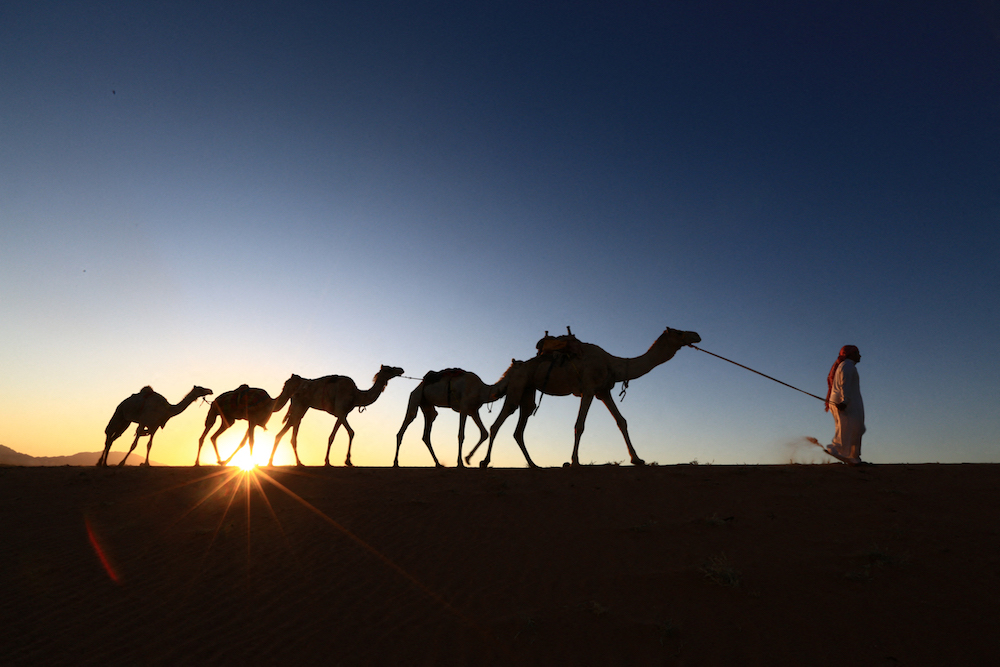
A Saudi man leads camels as he heads back home from a training center on April 1, 2016 near the city of Tabuk, located some 1500km northwest of the capital Riyadh. (AFP)
To maintain the authenticity of camel breeds and to guard against mistreatment, organizers have in recent years cracked down on more invasive cosmetic enhancements.
At last year’s festival, 43 contestants were disqualified after breeders used botox injections and other forms of “tampering” to enhance their animals’ appearance.
According to SPA, some breeders even injected their camels with silicone and fillers, while others artificially inflated their animals’ body parts using rubber bands.
To detect any such tampering, festival judges and veterinarians thoroughly examine each camel with X-ray machines and sonar devices.
Stricter regulation means it takes a great deal of time and planning for breeders to prepare an animal for such a pageant, including the provision of proper transportation, fodder, health care and nutrition.
During the festival and throughout the year, breeders meet to buy and sell camels that have specific beauty criteria, striking deals valued in millions of dollars.
Mousa Al-Mousa, a camel owner, recently sealed a deal worth SR80 million ($21.3 million) to buy 17 deq camels from fellow breeder Mohammed bin Jokhdob.
More than 70 camels were auctioned in just the first three weeks of the current festival, with the highest demand for wodh and sofor.
While the value of camel sales has exceeded SR500 million at this year’s festival, the market value of the festival in the first five weeks amounted to about SR10 billion. Several major companies in Saudi Arabia sponsored the event.
Preparing for such competitions is a way of life for many camel breeders. In recent months, Mijbil Aldhifiri, a young businessman from Hafar Al-Batin in the Eastern Province, told Arab News that he had spent up to 12 hours a day caring for his prize-winner, Thokor.
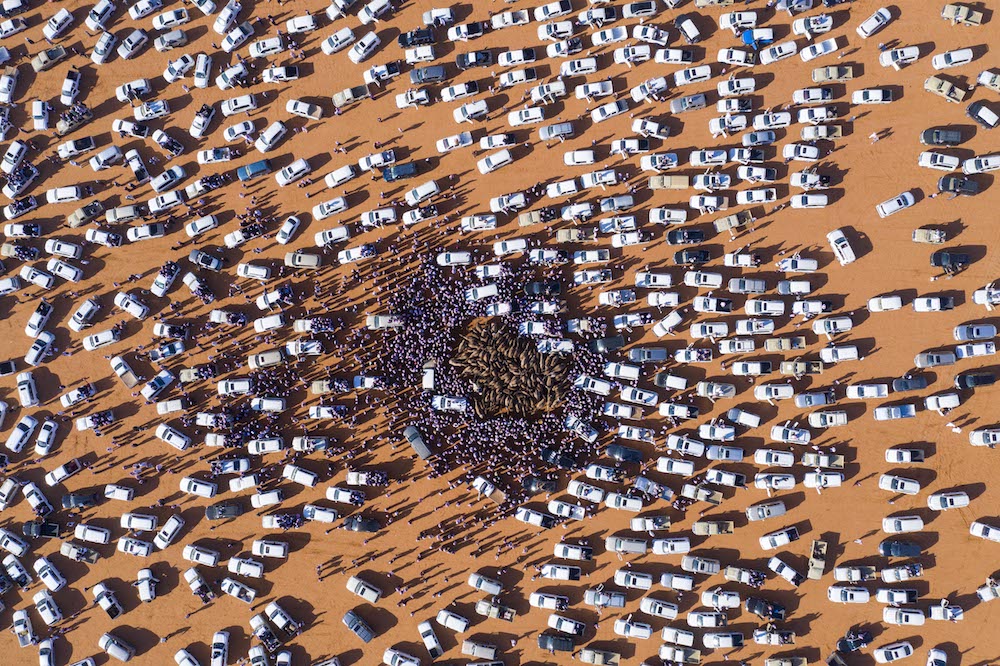
Cars and people surround camels for sale during the annual King Abdulaziz Camel Festival in Rumah, some 160 kilometres east of Riyadh. (AFP)
Another camel owner, Abdulaziz bin Shouraim, told Arab News that he was looking forward to participating in the next festival, adding that he struggled to purchase a camel with prize-winning looks, such is the high demand for such contenders.
Organizers have sought to diversify the festival by introducing new competition categories, including last year’s launch of a camel race for female breeders. This year they introduced the International Camel Organization event, where Royal Omani camel riders made their debut.
More than 32 participants from around the world competed in this year’s beauty pageant, which took place on Jan. 8.
Fifteen participants — nine from Iraq, two from Egypt, and one each from Yemen, Libya, Britain and India — qualified for the final round of judging. In the end, though, it was an Iraqi entry that came away with the prize for the most beautiful camel.
Iraq’s Watbaan Jabo Abbas Al-Rafi was ecstatic at taking first place.
“I was honored to participate in the festival’s competitions,” he told Arab News. “I thank all those in charge of it, as this festival today has become a global event with the participation of many countries.”
